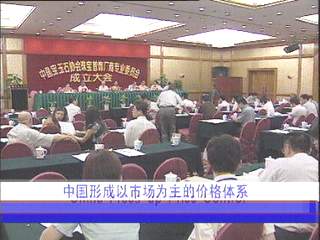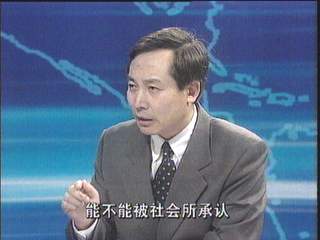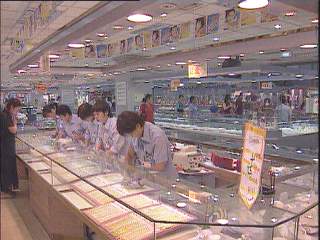 The State Development Planning Commission recently published a new price list of commodities, reducing the number of products under state control to 13. In the past, the state controlled the price of almost all goods, but now it has decided to let the market readjust the prices.
The State Development Planning Commission recently published a new price list of commodities, reducing the number of products under state control to 13. In the past, the state controlled the price of almost all goods, but now it has decided to let the market readjust the prices.
With the release of the new price list, over a hundred commodities, including pure gold jewelry, have been freed from government control so that they can compete freely in the international market. Within a few days, the China Gem Association established a Special Committee of Gem Manufacturers.
Bi Lijun, chairman of the China Special Committee of Gem Manufacturers, said, "Its members are all domestic entrepreneurs specialized in the field, especially in marketing. Therefore, the rules they created fit the market and are acceptable by the market. The rules are free from any government control, and are purely made for service purpose."

The Caishikou Department Store in Beijing is known as the number one store for gold jewelry. Its gold price is based upon the price released by the People's Bank of China, the central bank, and the international gold market price, plus processing expenses and taxes. For a long time the government decided the price of gold. Specialists in the field believe this system didn't do any good to the growth of the industry.
Wang Chunli, general manager of the Xinshiji Shop, Beijing Caishikou Dept. Store, said, "The previous method of deciding a price prevented pure gold jewelry from developing to a refined stage in the first place. To make a plain gold ring for example, there is one procedure. But to make a highly refined art piece, a dozen processing procedures are required. The manual work involved differs and the loss is different. I believe that after the price gets out of government control, it should be good for the future market. Highly refined pieces can sell at a high price, while crude ones get low prices. What consumers spend matches its value. Good stuff costs more. People accept it."
 This well-known jewelry store in Beijing is getting well prepared for the market change after China joins the WTO. Beginning this year, the company has been training its staff overseas to expose them to advanced technologies in jewelry processing and marketing. The general manager has just joined a brand name appraisal meeting organized by the newly established Gem Committee, in a hope to gain an upper hand in the market after the price is no longer controlled.
This well-known jewelry store in Beijing is getting well prepared for the market change after China joins the WTO. Beginning this year, the company has been training its staff overseas to expose them to advanced technologies in jewelry processing and marketing. The general manager has just joined a brand name appraisal meeting organized by the newly established Gem Committee, in a hope to gain an upper hand in the market after the price is no longer controlled.
Bi Jingquan, head of the Price Dept., State Development Planning Commission, said, "In fact, the price release indicates the prices of most commodities, apart from the 13 commodities still under state control, will be influenced by the market. The fluctuation of prices will guide investors, who in turn decide which industry should stay in the market and which should not, during competition."
Since 1992, new technologies and industries have entered the ever-opening Chinese market. Their prices were not on the list of government control at the beginning. One example is telecom equipment. The growth of this new industry enables people to see how market price readjustment functions.
Bi Jingquan said, "Under the government price control system, people tend to generate a mentality of relying on the government for everything. Now, they have to rely on themselves to do their best to get their product accepted by consumers. Whether or not their products can be accepted is up to the market to decide. In this case, improving the quality and reducing the cost are important. Consumers' money is in fact a vote for your products. It tests an enterprise's technical level, quality control and after sales service. It's an overall check up. So, to get a threshold in the market, it's no longer dependent on government support, but on competition. So after the price is freed, it is good to increase the competitiveness of Chinese-made products in the Chinese and international markets. It is an important measure."
Zhao Ming, vice president of Shanghai Bell, said, "If the price of our equipment is set by the government upon establishment of our company; our company, including our counterparts, will not experience such a big change today as over the past years. It is not possible for China to have such a fundamental change in its telecommunication industry, or at least, its development would have been delayed tremendously."
China began importing program controlled switchboard equipment in the early '80s. At that time, and one unit cost 300 US dollars. From this product alone, overseas companies were well rewarded in the Chinese market. If that high price had persisted in the Chinese market, it would have affected the import quantity and hindered the telecommunications industry in China. In the '90s, some manufacturers in the industry made major breakthroughs in developing the product. Although the market is relatively saturated, and the price per unit is dropping, a low price is no longer a threat to Chinese telecommunications manufacturers, due to the experience they gained in market competition.
Zhao Ming said, "Targeting our present clients, we try to expand our service scope for additional profit. In addition, we have developed a relatively low cost product, which suits a rural market. In a word, we would be reluctant to tap the potential if there was no market competition."
This company's product has about one-third of the market share. Besides, almost all new telecommunications equipment are made in China. Chinese products are very competitive in Southeast Asia due to low prices, resulting from low cost.
|